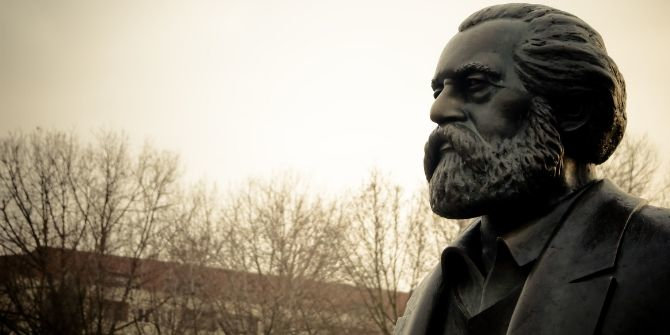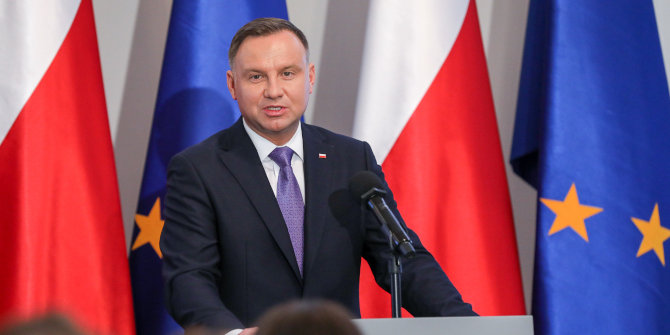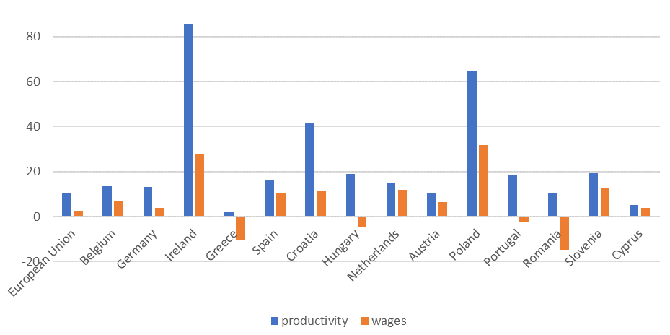
 At the end of November, the European Court of Human Rights ruled that the conviction of former Icelandic prime minister Geir Haarde over his handling of the country’s financial crisis was fair. Ragnar Hjalmarsson and Iosif Kovras examine whether political leaders should face criminal proceedings following a crisis, and what the potential pitfalls are for democracy.
At the end of November, the European Court of Human Rights ruled that the conviction of former Icelandic prime minister Geir Haarde over his handling of the country’s financial crisis was fair. Ragnar Hjalmarsson and Iosif Kovras examine whether political leaders should face criminal proceedings following a crisis, and what the potential pitfalls are for democracy.

Former Icelandic Prime Minister Geir Haarde, Credit: Arctic Circle (CC BY 2.0)
Prosecuting politicians has become popular in the aftermath of the recent global financial crisis. It has mobilised such diverse groups as the Occupy movement and the Indignados in Southern Europe and inspired Trump’s supporters to ask for Hillary Clinton to be ‘locked up’.
The idea of apportioning blame is appealing, and a strong case can be made for seeking accountability, including restoring trust in state institutions and preventing the rise of populism. Less attention has been paid to the perils of prosecuting politicians after crisis. This can partly be attributed to the fact that most countries did not prosecute their political elites after the 2008 financial meltdown.
Iceland is the exception, setting up a Court of Impeachment to try the former Prime Minister for his role in the run-up to the crisis. This makes the Icelandic experience particularly instructive. Iceland’s ‘crash’, which demolished 97% of the banking system within a few days, was followed by a determined policy of accountability. The Office of the Special Prosecutor, a novel prosecutorial authority set up immediately after the crash, has convicted more than 30 bankers responsible for crimes committed in the lead-up to the crash.
An independent truth commission carried out a detailed fact-finding investigation; nine volumes documented the causes of the crash, and offered recommendations to reform state institutions. The commission was by far the most successful commission of inquiry in the aftermath of the Global Recession. Importantly, the report found Prime Minister Geir Haarde responsible for failing to take necessary action to respond to the coming crisis.
Citing the truth commission report and the collected evidence, Iceland’s parliament, in a polarised vote, set up a Court of Impeachment – a special tribunal. Although the tribunal acquitted Haarde on most charges, it found him guilty of gross negligence: he failed to hold official ministerial meetings to formally inform Cabinet of the major danger facing the banks and the State Treasury. He was the only leader of the Western world to be convicted for his pre-crisis conduct.
Mr Haarde took his case to the European Court of Human Rights on the grounds that the Icelandic process had been politicised and he did not receive a fair trial. Yet at the end of November, the European Court upheld the original ruling. The ruling is a landmark one and raises some fundamental questions about the utility of the growing influence of the courts in times of crisis.
Should we prosecute political leaders after a crisis?
Clearly actions punishable by law should be prosecuted. Yet, should the courts hold policy-makers to account for their decisions or should the voters hold them accountable at the ballot box? In effect, is this the remit of the law or politics? This central question has political repercussions in other countries in crisis.
Should Greece, for example, prosecute Yanis Varoufakis – the flamboyant former Greek Finance Minister – for his reckless negotiating strategy with Greece’s external creditors in 2015? Criminalising politics and decision-making can have a high cost, particularly in times of crisis. The prospect of criminal liability could weaken decision-making when decisiveness is most needed. The recent ruling on the Icelandic PM may set a precedent with grave unintended political consequences. In the face of future crisis, leaders may seek to protect themselves from future prosecutions rather than take decisive action.
Second, should courts apportion criminal liability retrospectively based on the consequences of actions or omissions? By finding Haarde guilty of ‘gross negligence’ for not holding meetings in the run-up to the crisis, the court implies that had more meetings taken place, the impact of the crash would have been ameliorated. This ex-post-facto rationalisation is inaccurate and dangerous.
A counterfactual may help illustrate this point: if Haarde had kept the cabinet informed about the dangers and this information had leaked to the press, this most certainly would have accelerated the crash. Economic crises are complex and political leaders have to take one-shot decisions based on limited information available to them. Apportioning criminal responsibility based on the unintended consequences of decisions made in times of crisis can be a dangerous precedent.
Third, such prosecutions may legitimise populists who ride the tide of popular discontent and demand ‘more heads to roll’. As our research with colleagues shows, the excessive focus on scoring political points for past actions or omissions polarises political debates and is an active barrier to consensus-building, something necessary for forward-looking policies of reform. Haarde’s trial haunts the political debate in Iceland. Even members of the opposition parties believe it was a mistake, unnecessarily polarising political debates, leaving a mark on Iceland’s political culture of consensus-building and slowing down the nation’s healing.
The take home lesson is not to let political elites off the hook. Rather, we need to be aware of the pitfalls of criminalising decision-making in times of crisis. Iceland offers an ideal example of an alternative form of accountability, namely carrying out a serious investigation to publicly acknowledge the truth about the causes and those responsible for the crisis. As our research shows, the report of the truth commission not only shed light on individual responsibility, but also converted past policy failures into lessons for future reform. Forward-looking policies could bolster consensus, minimise polarisation and ultimately pave the way for a healthier recovery.
Please read our comments policy before commenting.
Note: This article draws on findings from a collaborative project on the politics of accountability after crisis, sponsored by the Economic and Social Research Council (code: ES/M011321/1). The article gives the views of the authors, not the position of EUROPP – European Politics and Policy or the London School of Economics.
_________________________________
 Ragnar Hjalmarsson – Hertie School of Governance
Ragnar Hjalmarsson – Hertie School of Governance
Ragnar Hjalmarsson is a PhD candidate at the Hertie School of Governance in Berlin.
–
 Iosif Kovras – City, University of London
Iosif Kovras – City, University of London
Iosif Kovras is a Senior Lecturer in Comparative Politics at the Department of International Politics, City University London.






On the face of it, criminal prosecution for “gross negligence” seems unfair.
Surely this must be subjective.
I tned to think this with corporate cases too, when it is all too easy to see flaws in hindsight.
We don’t know what we don’t know – and none of us has a crystal ball !
A civil suit might be a different matter.
However politicians could be made liable for deliberate lying.
Cynics may say “lying is what politicians do” …. but many if not most try to avoid lying.
More likely they massage the truth for political purposes.
Please explain the asides about “populism” …. . They hint that new political movements that challenge a prevailing orthodoxy MUST be bad.
Such throw-away lines can read like an establishment supporter who doesn’t accept democracy …. or even an arrogant dismissal of “ignorant masses” !
Jules, I’ve seen you post this same tired accusation under countless articles. Someone uses the word populism and you lurch off into a rant about how it immediately means the authors must be establishment stooges (even though the article is on an entirely different subject). It really is beyond tedious and frankly disrespectful to the authors you keep slandering. Have some decency and retract this for once.
Burns,
I don’t know why I bite … but “slandering” ?
Is this another example of redefining the meaning of words?
Back to the (sub)topic ….
Please explain why very occasionally a new, (minority?) party is deemed “acceptable”, more often they are labelled “populist – mostly by “othering” – and some are labelled “far right” (or occasionally far-left) without any evidence to support these labels.
Which brings us back to the point of the article.
Criminal prosecution for “gross negligence” is very likely to be subjective, with the benefit of hindsight – and politically motivated.
However downright lies should not go unchallenged and potentially sanctioned.
Would you agree?
Haarde’ s neoliberal policies had been accepted by icelandic voters repetedly. It is not logical to prosecute politicians for implementing such policies. On the other hand, it is interesting to evaluate Haarde’s in-actions as a direct consequence of his neoliberal policies. The icelandic government saw the banking problem in 2008 as a liquidity problem and therefore supported the Central Bank as a lender of last resort. Can the verdict of the Court of Impeachment be seen as a ban on taking neoliberalism to the extreemes ?